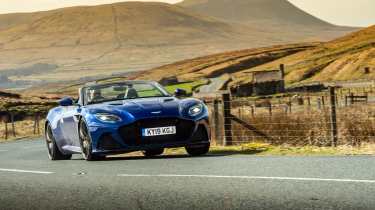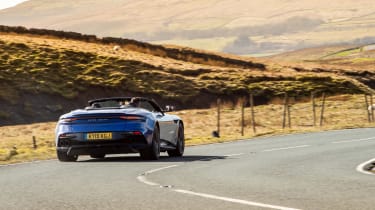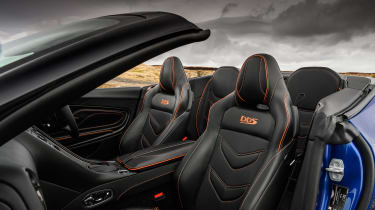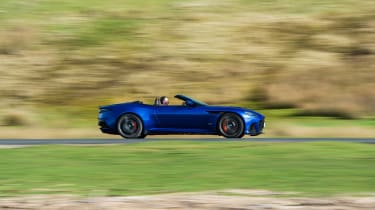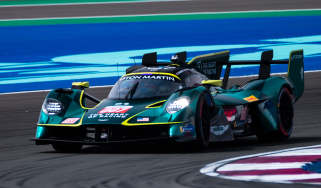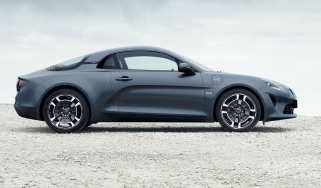Aston Martin DBS Volante 2022 review
The lack of a roof only adds to the DBS’s appeal as an immensely fast and super GT
When it comes to the more is more argument, few cars portray the notion better than Aston Martin’s flagship open-top GT, the DBS Volante. Powered by the firm’s 5.2-litre V12 with a full-fat 715bhp power figure, combined with a sumptuous four-seater interior and folding roof, it really is an example of sheer excess.
At nearly £280,000, it’s also the most expensive series production Aston Martin currently on sale, and with all its power being transferred through a weakened structure can it still deliver that mix of GT car and supercar that makes the coupe variant so appealing?
Under the vast clamshell is the familiar 5.2-litre twin-turbo ‘AE31’ engine, carried across from the DBS coupe. This means a peak power figure of 715bhp at 6500rpm and a thumping 664lb ft of torque from just 1800rpm. There’s the same, toughened, ZF eight-speed automatic gearbox, too, mounted at the rear as a transaxle, with paddles for manual changes mounted behind the steering wheel. Performance is blistering for such a big, heavy car, with 0-62mph passing in just 3.6sec and 100mph in only 6.7sec, just a few tenths off the lighter coupe. The top speed is 211mph, which should challenge even the most hardy of follicles. Aston Martin says a rework of the car’s Aeroblade 2 dynamics means that just 3kg of downforce is lost at V-max compared to the coupe, the figure now being 177kg.
Aston Martin’s use of carbonfibre body panels over the DBS’s aluminium chassis structure is a start when it comes to mass reduction, but additional structural bracing in the Volante as well as the roof mechanism means its kerb weight has soared to a figure the company rather sheepishly refers to as ‘from 1863kg dry’. With optional equipment and all fluids, this is easily a two-ton car.
More reviews
Group tests
Review
Reviews
The fabric roof has a completely electric operation and lowers in 14 seconds, raising again in 16 seconds. Its construction features eight layers, with the result being superb high-speed refinement, particularly for a car with a ‘soft’ roof. The fabric is available in different colours, and there are six different headliners to choose from on the inside. In fact, the list of possible personalisation options with colours, fabric and trim is almost endless, and a surefire way to inflate the purchase price by a significant amount.
Otherwise, the Volante closely follows the specification of the coupe. A carbon propshaft takes power to the rear axle, and the adaptive damping has GT, Sport and Sport Plus modes, just as the engine and gearbox mapping does, too. There are 21-inch wheels all round, with 265/35 Pirelli P Zeros on the front axle, and massive 305/30s on the rear. Braking is via carbon-ceramic discs, measuring 410mm/360mm, front/rear, which the DBS will be needing if it’s to contain its mighty levels of performance.
There’s a real sense of excess with the DBS Volante. Not necessarily in a bad way – just that it's a larger-than-life personality, in terms of size, image, noise and performance. Its gaping mouth gobbles up the road in front, almost occupying the entire lane, and with the roof lowered you’re very much on public show, which will delight some and leave others cringing. It’s an extravagant, opulent experience.
It’s also a comfortable one. Although the Volante’s interior fails to delight in quite the way a car of this price should, it’s a very comfortable place from which to tackle a long journey, although the same probably can’t be said for the rear seats, which are for kids or luggage only. Wind noise is hushed with the roof up, and buffeting minimised with it lowered, all of which is so easy to do with just a single press and hold of a button.
Yet it’s the V12 that seizes centre stage – and won’t relinquish its grip for the entire time you spend with the car. As the numbers suggest, the performance is absolutely enormous, the way the torque overcomes the car’s mass, imperious. The V12 hits hard from next to no revs and then keeps on pulling. To really get a feel for what this means, disable entirely the traction control in the car’s submenus and then floor the throttle at a standstill. Most of the time the car will pause for a millisecond then shoot forward, but almost immediately the rear will lose grip, and suddenly the Volante is accelerating up the road leaving a cloud of burnt rubber and two black lines behind. And it keeps going, to the point where you may even hook fourth gear with a click of the paddles and the Volante is still bonfiring its rears. It’s wild.
As unlikely as it sounds, you can hustle the Volante and it won’t just roll over and surrender, begging for a return to floating down a boulevard; miraculously the brakes are up to the job, and the Pirellis smear themselves over the road in a bitter fight for traction until the death. It steers with a beautifully natural resolve and sense of precision, and while it’s possible to detect the odd shimmy through the structure, it’s far from being structurally flaccid. The rear suspension certainly has a task to contain the engine’s rampaging torque, and if you’re greedy with the throttle it’ll skip and buck a little, but it’s noticeable how much the DBS has improved in this regard compared to the only examples we drove. Drive it hard, and it’s well worth using the modes; Sport Plus suspension is a bit too firm for most roads, but the extra control of Sport controls the weight transfer, unlike the ‘everyday’ GT setting. The more aggressive engine maps also give more sound as well as throttle response, and a series of pops and bangs on the overrun as well.
All told then, it’s hard not to love the Volante. It’s a big car with a big heart, and a surprisingly wide operating window, that offers a blend of attributes unavailable anywhere else.
Price and rivals
One of the key appeals of the Volante is its lack of obvious rivals. Bentley Continental GT Speed Convertible? Luxury, comfort, yes, but nothing like the sporting ability. Ferrari 812 GTS? True, that’s a V12 roadster with what will surely be towering performance, but if it’s anything like the coupe it’s also a real live wire, and not the relaxing companion a DBS can be.
McLaren’s 720S Spider is a hair-raising supercar, but one that lacks the long-legged ease and comfort of the Aston Martin – superb ride quality notwithstanding. Overall, though, it will likely appeal to those who want the ultimate open-top Aston Martin experience, one that suits the DBS’s delightful excessiveness down to a tee.

